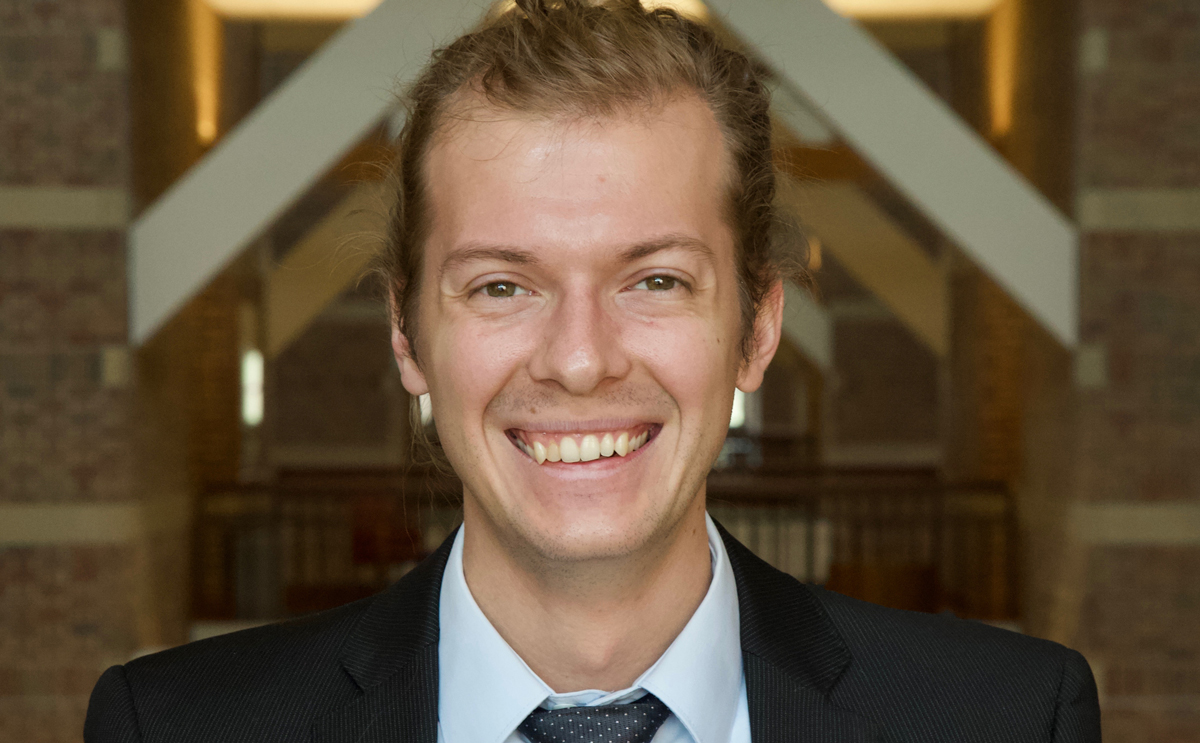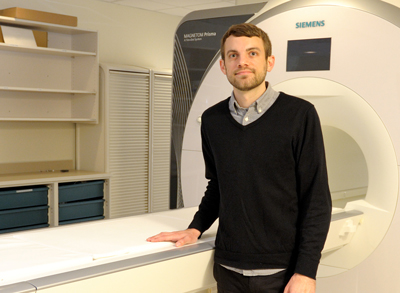Editor's note: See our Director's Seminar webpage for upcoming speakers, topics, and videos of past lectures.
Kevin Clark and Matthew Moore, both former Beckman Institute Postdoctoral Fellows, will speak at the Beckman Institute's virtual Director's Seminar at noon Thursday, Dec. 2. Clark will present "Deciphering the function of RNA modifications in the central nervous system," and Moore will present "Multi-method investigations of individual differences across spatial and temporal scales in the human brain."
Registration is required to attend on Zoom.
 Kevin Clark.
Kevin Clark."Deciphering the function of RNA modifications in the central nervous system"
Apart from the four canonical nucleotides of RNA (A, U, G, and C), an expanding collection of over 150 RNA modifications exists that substantially diversifies the RNA code that is known as the “epitranscriptome.” These unusual chemical modifications range in complexity from simple methylations to conjugation with cellular metabolites and are enzymatically deposited/removed with sequence specificity to carefully control the biophysical properties of cellular RNA biopolymers. Analogous to DNA methylation and epigenetic modifications that regulate gene expression, the epitranscriptome has emerged as a potent regulator of mRNA translation. However, characterization of RNA modifications in the central nervous system has been impeded by the complexity of animal models and lack of analytical methods capable of simultaneously detecting multiple modified RNAs in small-volume samples. These shortcomings have rendered the field of RNA modifications unable to account for the heterogeneous distribution of epitranscriptomic marks that potentially exists across the CNS and in single neurons. In this talk, Clark will describe how recent advances in the analytical measurement of modified RNAs are beginning to reveal a previously uncharacterized link between dynamic RNA modifications and CNS function.
Kevin Clark received his Ph.D. in analytical chemistry from Iowa State University in 2018 and was awarded a Beckman Institute Postdoctoral Fellowship in 2018 to study RNA modifications in the central nervous system with Professor Jonathan Sweedler and Professor Rhanor Gillette. Now a postdoctoral research associate in Prof. Sweedler’s lab, Kevin is developing single-neuron approaches to profiling dynamic RNA modifications to better understand how they contribute to learning and memory.
"Multi-method investigations of individual differences across spatial and temporal scales in the human brain"
 Matthew Moore.With recent advancements in brain imaging and physiological recording methods, there has been growing interest in examining and characterizing human individual differences across spatial and temporal scales in the brain. In this talk, Moore will describe recent work, conducted with an extensive group of collaborators at the Beckman Institute, that has advanced the tools available for examining the dynamics of human brain function through the novel approach of simultaneously recording functional magnetic resonance imaging, event-related potentials, and event-related optical signals. Moore will discuss findings from combinations of these methods, noting the convergence and complementarity of the measures, as well as the advantages that are not possible unless recording the methods simultaneously. He will also highlight links from these advancements to other research areas that can be combined to further our understanding of the neural correlates of individual differences.
Matthew Moore.With recent advancements in brain imaging and physiological recording methods, there has been growing interest in examining and characterizing human individual differences across spatial and temporal scales in the brain. In this talk, Moore will describe recent work, conducted with an extensive group of collaborators at the Beckman Institute, that has advanced the tools available for examining the dynamics of human brain function through the novel approach of simultaneously recording functional magnetic resonance imaging, event-related potentials, and event-related optical signals. Moore will discuss findings from combinations of these methods, noting the convergence and complementarity of the measures, as well as the advantages that are not possible unless recording the methods simultaneously. He will also highlight links from these advancements to other research areas that can be combined to further our understanding of the neural correlates of individual differences.
Matthew Moore received his Ph.D. in psychology from the University of Illinois Urbana-Champaign in 2018, and was a Beckman Institute Postdoctoral Fellow from 2018 to 2021. He is now an Associated Health Fellow at the Palo Alto VA Medical Center in Palo Alto, California. His research seeks to identify and examine potential biomarkers that will help improve models of brain functioning, and can contribute to the promotion and enhancement of well-being through better conceptualization, prevention, and treatment approaches.